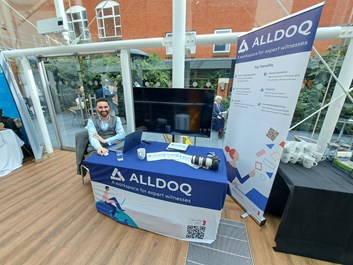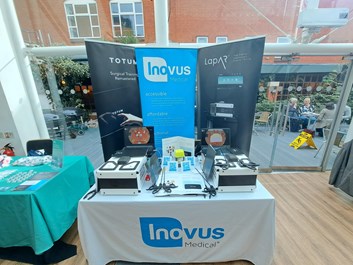Menu

The Faculty of Perioperative Care (FPC) held its 9th Annual Conference on the 7 October in Birmingham. The theme of this year’s conference was ‘The Role of the Extended Surgical Team in the Digital World’’ with speakers covering a wide range of topics including robotics in surgery and the enhancement of extended team roles during the COVID-19 pandemic.

Held once again at the Studio in Birmingham, the conference was preceded by a series of workshops on the previous day. These were held at the Royal College of Surgeons of Edinburgh offices in Birmingham. The workshops offered delegates a cross section of relaxed experiences from CV writing and professional development led by Julie Quick, editor of the Journal of Perioperative Practice and Senior Lecturer at Birmingham City University to hands on simulation experiences offered by ConMed and Ethicon. The team from Ambu demonstrated digital bronchoscopy resources and BMS Critical Care Ltd provided a workshop on the Easi-Flush® device. A session on Digital Solutions in Healthcare was offered by Getinge.
With the focus on the conference theme of the Extended Surgical Team in the Digital World, the first session had as its subject assisting with robotic surgery and the need to get it right. The speakers represented an experienced surgeon six months into his robotic learning experience, a senior surgical trainee, and an experienced Surgical Care Practitioner (SCP). One of the common themes was the need for effective communication between the surgeon and assistant ‘partner’ the term used by Rajeev Peravali. This was likened to the relationship between a rally driver and their co-driver by Bradley Russell, the SCP, who stressed the importance of the patient side assistant being aware of their own physical needs when assisting – a point relevant to anyone assisting a minimally invasive procedure. Alexia Ferrugia highlighted the impact that robotic surgery is having on surgical trainees – not because of the use of SCPs as patient side assistants, but because consultant surgeons have the need to develop their robotic skills.
David Rawaf from INOVUS spoke on the topic of simulation in surgical skills training and the benefits that this brings to patients; and after the lunch break this was followed by a presentation by Richard Williams-Lees from ALLDOQ on the benefits of digitation in relation to the management of medico-legal cases. Both presentations from the conference sponsors provided valuable information for delegates and enabled an appreciation of these topics.
Tim Terry, a retired Professor of Urology who now provides professional mentorship, spoke to delegates about the need to care for one’s emotional wellbeing and the benefits that this brings to individuals and patients alike. He explored the use of self-assessment tools for identifying burnout and identified some of the strategies that members of the Extended Surgical Team (EST) can use to support their wellbeing.
The SARS-CoV-2 pandemic generated many challenges for healthcare providers, some of which have persisted, and the next session of the day sought to explore some of the innovative strategies that were developed to manage these.
The team from the NHS Scotland Academy outlined the development of an accelerated Surgical First Assistant programme to support the development of treatment centres to overcome the backlog of operations resulting from the pandemic, followed by a presentation by Jody Carvell, an SCP working for Nottingham University Hospitals and a student on the Anglia Ruskin University MSc Surgical Care Programme. Jody discussed the development of digital follow up for patients who have undergone laparoscopic cholecystectomy. This was followed by Emma Tindall from the North Tees and Hartlepool NHS Foundation Trust. As an experienced SCP who worked throughout the pandemic, Emma outlined the ways in which, to support patient care, she and her team sought to look after themselves and each other. This was something that was picked up on during the question / comment session by Mr Terry as the expert on resilience. The final speaker of the session was Ramanjit Kaur, a Physician Associate (PA) working in cardiothoracic surgery at the John Ratcliffe Hospital. Ramanjit outlined the work that she and other PAs were involved in during the pandemic in support of the virtual Covid ward run by the hospital and how this links with her current practice – also utilising a ‘virtual’ approach to patient care. She identified for delegates the expectations placed on her as a PA and the supervision that is provided by regulated clinicians.
With the afternoon drawing to a close, Juliette Murray, lead of the Faculty of Perioperative Care, provided an overview of work undertaken by Colin Woodard in relation to role-specific appraisal for members of the Extended Surgical Team. Unable to attend in person, Colin has agreed to share the resources that he has developed via the Faculty’s website. Juliette then went on to outline the benefits to SCPs of signing up to the Managed Voluntary Register.
The abstract competition was very popular this year with a wide range of submissions from both junior hospital doctors and surgical care practitioners. The podium presentation competition was judged by Jenny Abraham and Susan Hall, with the Swann Morton Prize being awarded to Dominic Thomson for a project using technology to develop the communication of post-operative care planning amongst the EST after emergency laparotomy. Second Prize was awarded to Haya Maki for a presentation on compliance rates of enhanced recovery after surgery online proforma within colorectal surgery. The convenors would like to thank Sally Stuart, Course leader of the Edge Hill University MSc Surgical Care Practice programme and her counterpart from Anglia Ruskin University, Frances Page, for judging the poster competition that arose from the abstract submissions. The Swann Morton prize was awarded to Gourav Garg’s poster on ‘How to self-administer Enoxaparin at home’ with second prize being awarded to Marie Stein for her poster on ‘Establishing a new Surgical Care Practitioner led service for breast pain management.’
The conference convenors are particularly grateful to the conference sponsors INOVUS and ALLDOQ and to Swann Morton for providing the prizes for the abstract competition and their support of our annual conference.
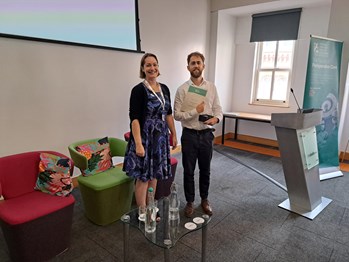
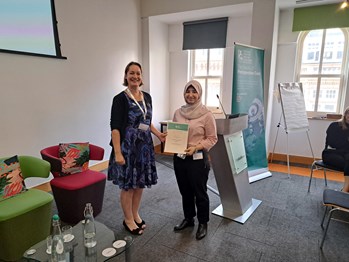
Left - Right, FPC Lead, Juliette Murray presenting award to Dominic Thompson and Haya Maki.
Congratulations also goes to joint winners of the poster presentation, Gourav Garg and Marie Stein.
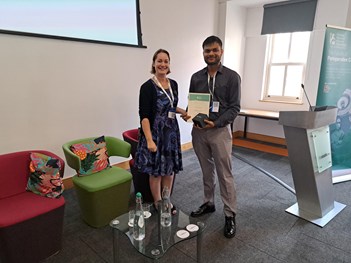
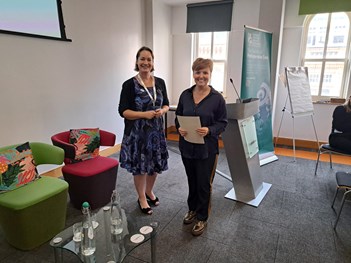
Left - Right, FPC Lead, Juliette Murray presenting award to Gourav Garg and Marie Stein.
Thank you to everyone who attended and to our sponsors ALLDOQ and Inovus Medical.
